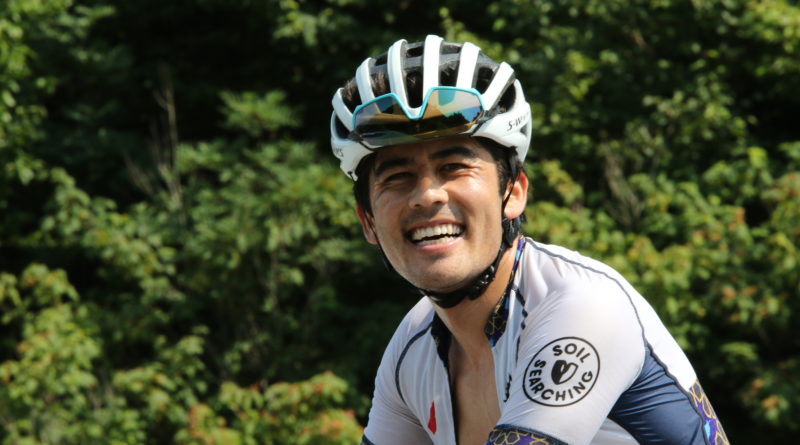Freedom and Bikes
When I first learned to ride a bike, it meant two things: freedom and joy. The joy came from going faster than my little 5-year-old legs could ever run. The freedom came from being able to go where I wanted, when I wanted, without an adult. Later, much later, it meant freedom to stop thinking about all the other things in life and just ride. Just ride.
What if that freedom were taken away?
In late July, Farid Noori, a 2019 Middlebury College grad and native of Afghanistan, rode up the Appalachian Gap 21 times in a row, climbing the elevation of Afghanistan’s tallest mountain, Mt. Naw Shakh, some 24,580 feet. He did it to raise money for the Sayed Ul Shuhada girls’ high school. In May, it was bombed by the Taliban killing 90, primarily teenage girls.
The App Gap ride took Noori over 11 grueling hours. He raised $9,000 of his $25,000 goal. “It hurt like hell, but that’s what climbing to the highest point of your country should feel like,” he wrote after the ride on Instagram.
For much of the summer, Noori had visited mountain bike clubs around Vermont and elsewhere to raise donations – money, bikes, gear, anything – for MTB Afghanistan, an organization he founded in 2018. He had planned to be at Ranch Camp in Stowe on Aug. 27 to collect bikes.
“We use the bike as a tool to bring joy and hope into the lives of Afghan youth and promote gender equality,” he told Voice of America just before his App Gap ride in July. “We believe the bike is the most effective tool for the emancipation of Afghan women and normalizing their freedom of movement in Afghan society. We organize events and provide equipment to get more Afghan women on bikes.”
Noori came to the U.S. for high school on a scholarship and discovered mountain biking. He went to Middlebury College and started racing. Vermont Sports profiled Noori and wrote about how he started Afghanistan’s first cross-country mountain bike event, the Hindu Kush Challenge, in 2018. When Noori went home and started training local Afghan riders, four of the eight men he worked with were riding cruisers. Mountain bikes were scarce. The trails they rode were often goat paths.
In August, 2021 as the Taliban took city after city, that freedom to ride disappeared, especially for women. MTB Afghanistan’s website went dark, and became password protected.
Noori posted the following on his Facebook page:
“There are no words to convey our deep sadness about the overnight changes in Afghanistan. It feels unreal to witness the dreams and hard work of our people getting crushed so easily. We mourn this moment and pray for the safety of our people.
As we wait to find more clarity in the coming days and months, we pause our activities and give our full attention to the safety and well-being of everyone who has been a part of our movement. Mountain Bike Afghanistan has always sought to take our people to higher altitudes, literally, through the peaceful act of pedaling a bike so that we can see our villages and what a beautiful country we inherit from up above.
Now more than ever, our mission to empower young Afghans and promote peace is needed. As such, we are committed as ever to continue our efforts to serve the Afghan youth. From the onset, we knew this would be a long haul to build a cycling nation, and these events won’t affect our determination to help our people find joy, peace and pride in what serves as our beloved Afghanistan’s foremost backbone: its nature. A sincere thank you for all your support since our beginnings three years ago. We continue.
He also wrote this moving story about what women in cycling in Afghanistan are facing.
The fundraising page is still live: —Lisa Lynn, Editor
Photo: Noori climbing the Appalachian Gap in August. Photo by Steve James/TheAddisonIndependent

